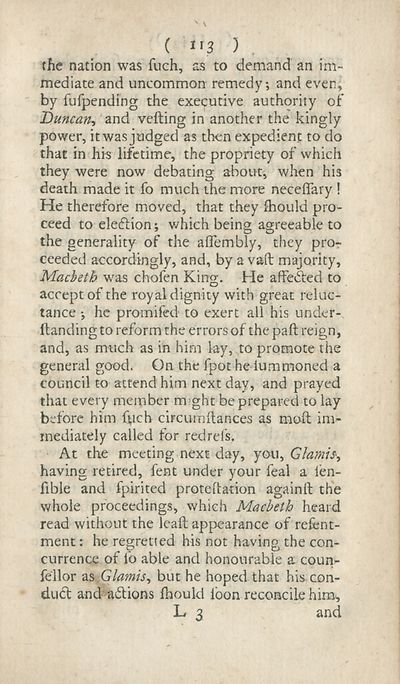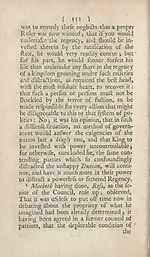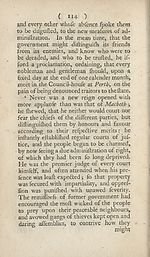Download files
Complete book:
Individual page:
Thumbnail gallery: Grid view | List view

( )
the nation was fuch, as to demand an im¬
mediate and uncommon remedy, and even,
by fufpending the executive authority of
Duncan, and veiling in another the kingly
power, it was judged as then expedient to do
that in his lifetime, the propriety of which
they were now debating about, when his
death made it fo much the more neceflary !
He therefore moved, that they fhould pro¬
ceed to eleflion; which being agreeable to
the generality of the aflembly, they pro¬
ceeded accordingly, and, by a vafl: majority,
Macbeth was chofen King. He affedted to
accept of the royal dignity with great reluc¬
tance •, he promifed to exert all his under-
ftanding to reform the errors of the paft reign,
and, as much as in him lay, to promote the
general good. On the fpot he lummoned a
council to attend him next day, and prayed
that every meipber nvght be prepared to lay
before him ftich circumftances as mo-ft im¬
mediately called for redrei's.
At the meeting next day, you, GlamiS',
having retired, fent under your feal a ien-
fible and fpirited proteftation againll the
whole proceedings, which Macbeth heard
read without the leaft appearance of refcnt-
ment: he regretted his not having the con¬
currence of fo able and honourable a coun-
fellor 2& filamis, but he hoped that his con¬
duct and&fc&ions fhould foon reconcile him.,
L 3 and
the nation was fuch, as to demand an im¬
mediate and uncommon remedy, and even,
by fufpending the executive authority of
Duncan, and veiling in another the kingly
power, it was judged as then expedient to do
that in his lifetime, the propriety of which
they were now debating about, when his
death made it fo much the more neceflary !
He therefore moved, that they fhould pro¬
ceed to eleflion; which being agreeable to
the generality of the aflembly, they pro¬
ceeded accordingly, and, by a vafl: majority,
Macbeth was chofen King. He affedted to
accept of the royal dignity with great reluc¬
tance •, he promifed to exert all his under-
ftanding to reform the errors of the paft reign,
and, as much as in him lay, to promote the
general good. On the fpot he lummoned a
council to attend him next day, and prayed
that every meipber nvght be prepared to lay
before him ftich circumftances as mo-ft im¬
mediately called for redrei's.
At the meeting next day, you, GlamiS',
having retired, fent under your feal a ien-
fible and fpirited proteftation againll the
whole proceedings, which Macbeth heard
read without the leaft appearance of refcnt-
ment: he regretted his not having the con¬
currence of fo able and honourable a coun-
fellor 2& filamis, but he hoped that his con¬
duct and&fc&ions fhould foon reconcile him.,
L 3 and
Set display mode to:
![]() Universal Viewer |
Universal Viewer | ![]() Mirador |
Large image | Transcription
Mirador |
Large image | Transcription
| Antiquarian books of Scotland > Languages & literature > Key to the drama > (135) |
|---|
| Permanent URL | https://digital.nls.uk/122387336 |
|---|
| Description | Thousands of printed books from the Antiquarian Books of Scotland collection which dates from 1641 to the 1980s. The collection consists of 14,800 books which were published in Scotland or have a Scottish connection, e.g. through the author, printer or owner. Subjects covered include sport, education, diseases, adventure, occupations, Jacobites, politics and religion. Among the 29 languages represented are English, Gaelic, Italian, French, Russian and Swedish. |
|---|

